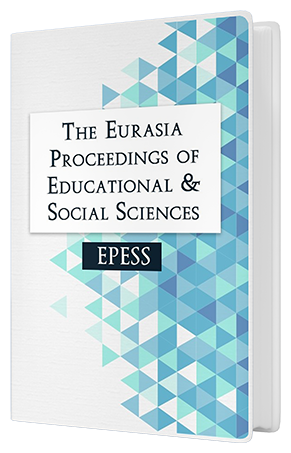Investigation of Secondary School Students' Views on the Distance Education in the Pandemic Process
DOI:
https://doi.org/10.55549/epess.1040452Keywords:
Pandemic process, Distance education, Secondary school studentsAbstract
In this study, it is aimed to reveal the evaluations of secondary school students regarding the distance education process in the pandemic process. For this research, phenomenology, one of the qualitative research designs, was used. 32 students studying in the fifth, sixth, seventh and eighth grades of a secondary school in Diyarbakır participated in the research. In the determination of the students participating in the research, the easily accessible and criterion sampling method, one of the purposeful sampling methods, was used. Students' views on distance education during the pandemic process were collected through a semi-structured interview form developed by the researchers. The interview form consisted of 17 open-ended questions. In the interview form, there were questions about thoughts on the distance education process, distance access opportunities, teaching practices, communication, time, precautions and expectations. Content analysis was used in the analysis of the data. When the findings of the study were examined, the students mostly emphasized that face-to-face education is good and distance education is boring. The students stated that they participated in distance education by using television at home, they found the course content sufficient in teaching practices, they evaluated the communication in the distance education process negatively, and they mostly communicated with their teachers in this process. While the students mostly stated that the course duration is not enough, they expressed the opinion that the broadcasting times prepared for distance education are appropriate. Students stated that they mostly experienced problems related to equipment and materials in this process, and that they solved these problems with the supply of equipment. Students mostly expressed their opinions about external expectations. Among the external expectations, the views on expectations from the teacher were mostly emphasized. In line with the results of the research, suggestions that are thought to contribute to distance education are included. Improvements can be made in internet infrastructure and base stations in rural areas. Internet service can be provided free of charge to all teachers and students through the Ministry of National Education. Different strategies, methods and techniques can be used in teachers' lessons so that students do not get bored with distance education.Downloads
Published
Issue
Section
License
Copyright (c) 2021 The Eurasia Proceedings of Educational and Social Sciences

This work is licensed under a Creative Commons Attribution-NonCommercial-ShareAlike 4.0 International License.
The articles may be used for research, teaching, and private study purposes. Any substantial or systematic reproduction, redistribution, reselling, loan, sub-licensing, systematic supply, or distribution in any form to anyone is expressly forbidden. Authors alone are responsible for the contents of their articles. The journal owns the copyright of the articles. The publisher shall not be liable for any loss, actions, claims, proceedings, demand, or costs or damages whatsoever or howsoever caused arising directly or indirectly in connection with or arising out of the use of the research material. All authors are requested to disclose any actual or potential conflict of interest including any financial, personal or other relationships with other people or organizations regarding the submitted work.




